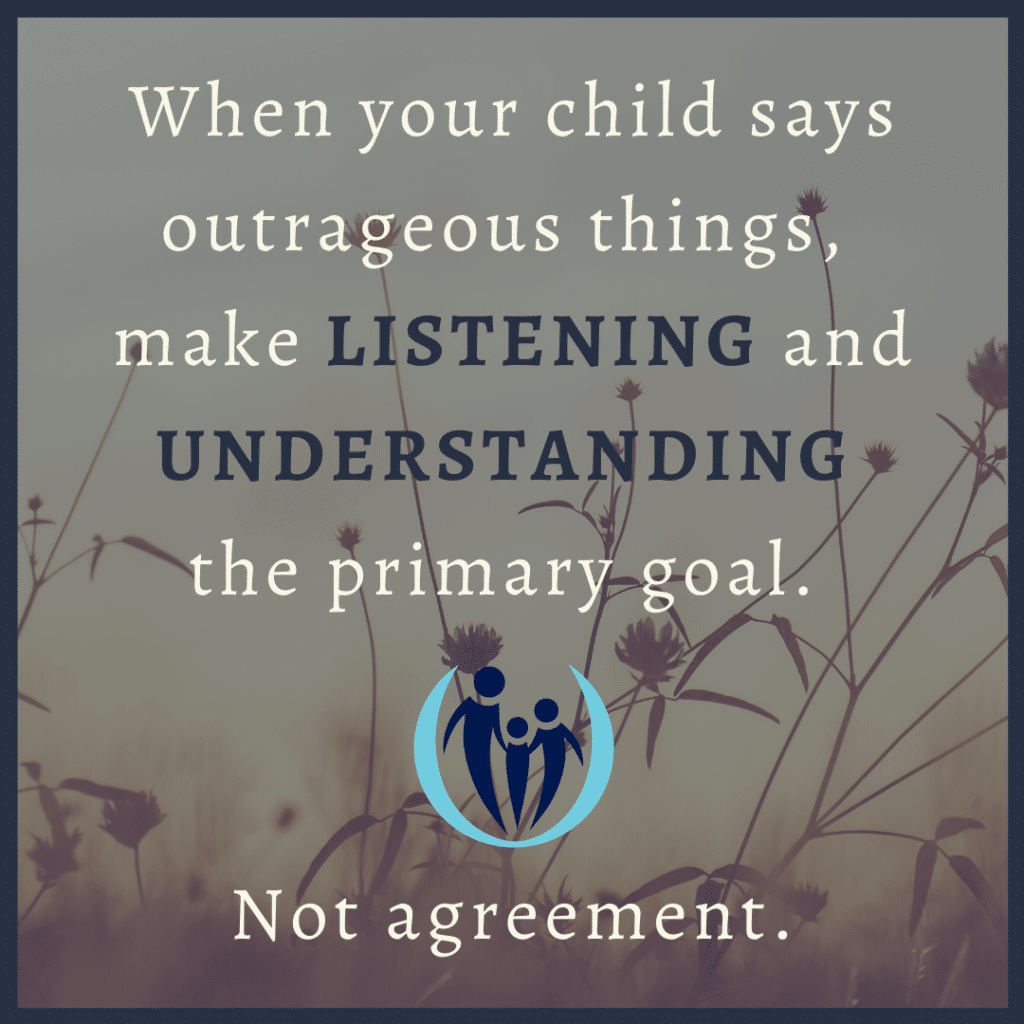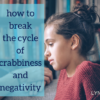
Stop the Crazy All-or-Nothing Thinking with These 4 Steps

Your child just said something completely exaggerated. It was all or nothing. All bad. Nothing right. And not the truth. It drives you crazy, right? But underneath the all-or-nothing thinking is likely a discouraged or anxious child.
When your child makes an outrageous statement, it’s hard to know how to respond.
Most parents’ first impulse is to try to correct faulty logic or begin arguing with the child. But this almost never defuses the situation. It also doesn’t figure out what is going on under the surface of such an exaggerated statement.
What does all-or-nothing thinking look like?
It’s likely that you have a rational, logical response to each of the statements below. Does this sound familiar?
Child: I’m so stupid! I’m no good at anything!
You: That’s not true. Yesterday you drew that great picture. I wish I could draw like you.
Child: That’s nothing. Anyone can do that. And I never make a basket and Billy makes them all the time.
You: Not anyone can draw like you can. I know I can’t. And Billy misses some baskets too.
Child: He doesn’t miss very many and I never make any.
You: I saw you make one yesterday. Maybe you just need to practice more.
Or, maybe one of these all-or-nothing arguments hits a little closer to home?
Child: You never make any food I like to eat. You always make food I hate on purpose. This food is awful.
You: That’s not true, I made chicken nuggets for you three times last week!
Teen: Vaping isn’t dangerous. Adults are just making a big deal over nothing.
You: Vaping IS dangerous. It’s addictive and there is a lot of research to back that up.
Teen: Who cares if I’m a little late for school? Half the school is late everyday anyway.
You: Being on time is important. It’s disrespectful to your teachers and classmates when you show up late.
Teen: Mrs. Johnson loves catching people for dress code violations. It’s what she lives for!
You: Mrs. Johnson has about a hundred other things she’d rather do than make sure people are in compliance with the dress code at school.
All of the responses above may be accurate. They seem like reasonable and rational statements which would be hard to logically refute. Right?
That may be true, but your child wasn’t speaking from a place of logic or rational thought when the exaggerated all-or-nothing statements were made, were they?

Two reflection questions when facing your child’s all-or-nothing statements:
Try to get under the surface to find out where this all-or-nothing thinking is coming from. In fact, there are two questions that position parents to be more thoughtful in their responses while creating a basic, core level of safety in relationships:
- What is going on in me that causes me to either try to shut down the conversation, or respond argumentatively?
- What is going on with my child that he would make such an extreme statement?
How might you respond when your child makes an outrageous all-or-nothing statement?
In our online course, The Power of Questions: Less Arguing. More Wisdom, Stacy Bellward and I teach parents a conversational model that will guide wisdom-building responses in kids.
4 steps to listen better when your child uses all-or-nothing statements
Here is how that conversational model might play out when your child engages in all-or-nothing thinking:
- You ask a lighthearted question. (What’s going on?)
- You listen to understand, not necessarily agree. (nod, uh-huh, hmmm)
- You might ask a clarifying question of your child. (Can you tell me more about that?)
- Once you have worked to clarify and understand your child, offer your own perspective and wisdom.
A healthy example of using questions to disarm all-or-nothing thinking
Let’s revisit the first scenario above and watch how it might unfold using this model:
Child: I’m so stupid! I’m no good at anything!
You: Oh my, what’s going on? (soft/safe tone of voice and a curious, light-hearted question)
Child: I can’t do anything right! I can never make a basket and Billy makes them all the time. I’m no good at anything!
You: It sounds like you wish you were better at basketball, is that right? (Listen to understand.)
Child: Yeah, I’m really bad and miss all my shots but Billy makes all of his. I’m no good.
You: What are you most frustrated with; that you don’t make as many baskets as Billy or that he makes basketball look easy or is it something else? (Clarifying questions to understand.)
Child: He can make baskets from all over and I can’t even make them from close to the hoop.
You: Sometimes people have natural skills that not everyone has but sometimes people who don’t have those natural skills can work to get better. (Offer your perspective.)
What do you think you might need to do in order to improve in basketball if it’s important to you?
The next time you hear an outrageous statement from your child (and you will hear an outrageous statement from your child again!), think about how you might want to respond. Calmly and thoughtfully asking a few questions can make all the difference in how your child responds and grows in wisdom.
If you want to learn more about what to do, or ASK, when your child says outrageous things, check out this podcast, “What to Say When Your Child Makes Outrageous Statements”.
In our online course, The Power of Questions: Less arguing. More Wisdom., you will learn the art of asking questions that build internal wisdom and character in your kids, and create a culture of teamwork in your family. Join us today!










